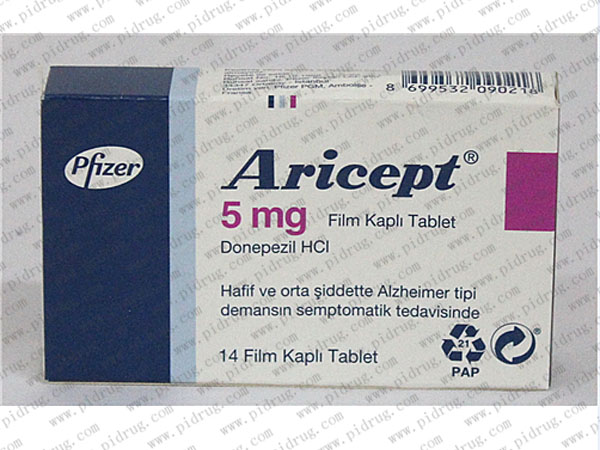药品详情:

【安理申ARICEPT(多奈哌齐) 简述】
安理申ARICEPT(盐酸多奈哌齐)是一种长效的阿尔茨海默病(AD)的对症治疗药。
【安理申ARICEPT(多奈哌齐) 适应症】
安理申ARICEPT(多奈哌齐)适用于轻、中度阿尔茨海默型痴呆症。
【安理申ARICEPT(多奈哌齐) 规格】
本品为片剂,规格为10mg/21片。
【安理申ARICEPT(多奈哌齐) 服用方法】
一次 2.5一 5mg ,一日 1 次,睡前服用,至少维持 1 个月,做出临床评估后,可以将剂量增加到一次 10mg ,一日 1 次,睡前服用。推荐最大剂量:为 10mg / d,3 一 6 月为一个疗程。
【安理申ARICEPT(多奈哌齐) 注意事项】
① 对盐酸多奈哌齐或哌啶衍生物高度敏感的患者禁用;
② 对心脏疾患、哮喘或阻塞性肺部疾患者有影响,也能增加患消化道溃疡的危险性;
③ 拟胆碱作用可能引起尿潴留及惊厥(可能与原发病有关),用药时应 注意观察;
④ 与琥珀胆碱类肌松剂、抗胆碱能药有拮抗作用,故不能并用。
【安理申ARICEPT(多奈哌齐) 不良反应】
最常见的是腹泻、恶心和失眠,通常是轻微和短暂 的,无需停药,在1~2d内可缓解。
ARICEPT(Donepezil)
Donepezil, sold as the trade name Aricept among others, is a medication used to treat Alzheimer's disease.[1] It appears to result in a small benefit in mental function and ability to function.[2] Use, however, has not been shown to change the progression of the disease.[3] Treatment should be stopped if no benefit is seen.[4] It is taken by mouth.[1]
Common side effects include nausea, trouble sleeping, aggression, diarrhea, feeling tired, and muscle cramps.[1][4] Serious side effects may include heart arrythmias, urinary retention, and seizures.[1] Donepezil is a centrally acting reversible acetylcholinesterase inhibitor.[1]
Donepezil was approved for medical use in the United States in 1996.[1] It is available as a generic medication.[4] In the United Kingdom a typical months supply costs the NHS about £8.44 as of 2019.[4] The wholesale cost of this amount in the United States is about US$1.38. [5] In 2016 it was the 98th most prescribed medication in the United States with more than 7 million prescriptions.[6]
Medical uses
Alzheimer's disease
There is no evidence that donepezil or other similar agents alters the course or progression of Alzheimer's disease. 6 to 12-month controlled studies have shown modest benefits in cognition or behavior.[7] The UK National Institute for Clinical Excellence (NICE) recommends donepezil as an option in the management of mild to moderate Alzheimer's disease.[8] The person should, however, be reviewed frequently and if there is no significant benefit it should be stopped.[8] In 2006 the U.S. Food and Drug Administration also approved donepezil for treatment of mild, moderate and severe dementia in Alzheimer's disease.[9]
Adverse effects
In clinical trials the most common adverse events leading to discontinuation were nausea, diarrhea, and vomiting.[10][11] Other side effects included difficulty sleeping, muscle cramps and loss of appetite. Most side effects were observed in patients taking the 23 mg dose compared to 10 mg or lower doses. Side effects improved with continued use.[12]
Precautions
Donepezil should be used with caution in people with heart disease, cardiac conduction disturbances, chronic obstructive pulmonary disease, asthma, severe cardiac arrhythmiasand sick sinus syndrome.[12]
People with peptic ulcer disease or taking NSAIDS should use caution because increased risk of gastrointestinal bleeding was noted.[12] Slow heart beat and fainting in people with heart problems were also seen. These symptoms may appear more frequent when initiating treatment or increasing the donepezil dose. Although occurrence of seizures is rare, people who have a predisposition to seizures should be treated with caution.[12]
Mechanism of action
Donepezil binds and reversibly inactivates the cholinesterases, thus inhibiting hydrolysis of acetylcholine. This increases acetylcholine concentrations at cholinergic synapses.
The precise mechanism of action of donepezil in patients with Alzheimer's disease is not fully understood. Certainly Alzheimer's disease involves a substantial loss of the elements of the cholinergic system and it is generally accepted that the symptoms of Alzheimer’s disease are related to this cholinergic deficit, particularly in the cerebral cortex and other areas of the brain.[13][14] It is noted that the hippocampal formation plays an important role in the processes of control of attention, memory and learning. Just the severity of the loss of cholinergic neurons of the central nervous system (CNS) has been found to correlate with the severity of cognitive impairment.
In addition to its actions as an acetylcholinesterase inhibitor, donepezil has been found to act as a potent agonist of the σ1 receptor (Ki = 14.6 nM), and has been shown to produce specific antiamnestic effects in animals mainly via this action.[15]
注:药品如有新包装,以新包装为准。以上资讯来源于网络或由高等医药院校的学生志愿者翻译(如有错漏,请帮忙指正),仅供医护人员内部讨论,不作任何用药依据,具体用药指引,请咨询主治医师。
如您发现本网站有文字编辑或内容错误,请点击此处发送(需要安装有foxmail或outlook支持),
或发邮件至:info@pidrug.com,香港济民药业感谢您的到访!
欢迎您添加香港济民药业微信,或在公众号内留言。



